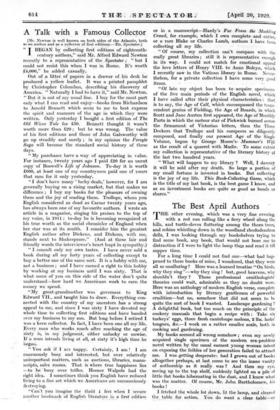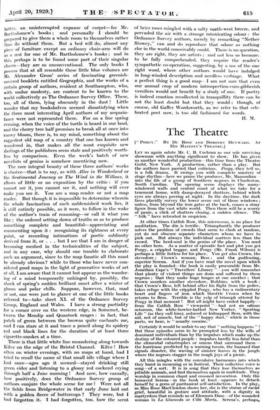The Best April Authors
THE other evening, which was a very fine evening, with a red sun rolling like a fiery wheel along the hills, and turtle-doves fluttering among the thorn trees, and robins whistling down in the woodland rhododendron dells, I was looking through my bookshelves trying to find some book, any book, that would not bore me to distraction if I were to light the lamp then and read it till supper time.
For a long time I could not find one—what had hap- pened to these books of mine, I wondered, that they were all so unalluring ? Here was a learned treatise "On birds, why they sing "—why they sing ! but, good heavens, why shouldn't they ? Those professional ornithologists' theories could wait, admirable as they no doubt were. Here was an anthology of modern English verse, complete with introduction by literary gentlemen of powerful erudition—but no, somehow that did not seem to be quite the sort of book I wanted. Landscape gardening ? A delightful book, but too much on the principle of the cookery manuals that begin a recipe with : Take six turkeys' eggs, three fresh canteloupe melons, 2 lbs. larks' tongues, &c.—I work on a rather smaller scale, both in cooking and gardening.
My books seemed all wrong somehow ; even my newly acquired single specimen of the modern sex-problem novel written by the usual earnest young woman intent on exposing the foibles of her generation failed to attract me. I was getting desperate: had I grown out of books altogether perhaps, at last_ come to see the inane vanity of authorship as it really was ? And then my eye, roving up to the top shelf, suddenly lighted on a pile of little flat books hibernating in the dust, and I knew what was the matter. Of course, Mr. John Bartholomew, kis books !
I fetched the whole lot down, lit the lamp, and cleared the table for action. You do want a clear table—or better, an - uninterrupted expanse of carpet—for Mr.- Bartholomew's books ; and personally I should be prepared to give them a whole room to themselves rather than do without' them. But a bed will do, almost any piece of furniture except an ordinary chair-arm will do as a rest for one of Mr. Bartholomew's books ; and in this, perhaps is to be found some part of their singular charm—they are so unconventional. The only books I possess that at all resemble these little blue volumes are Mr. Alexander Gross' series of fascinating greenish- covered booklets entitled Geographia, and the works of a certain group of authors, resident at Southampton, who, with undue modesty, are content to be known to the world collectively as The Ordnance Survey Office. These, too, all of them, lying obscurely in the dust ! Little wonder that my bookshelves seemed dissatisfying when the three most interesting April authors of my acquain- tance were not represented there. For on a fine spring evening, when the voice of the turtle is heard in our land, and the cherry tree half promises to break all at once into Snowy bloom, there is, to my mind, something about the raggedest old map of a country that one has known and wandered in, that makes all the most exquisite new darlings of the publishers seem stale and positively worth- less by comparison. Even the week's batch of new novelists of genius is somehow unenticing now.
The rare integral beauty of these three authors' works is elusive—that is to say, as with Alice in Wonderland or the Sentimental Journey or The Wind in the Willows, it allows of little or no exposition by the critic : if you cannot see it, you cannot see it, and nothing will ever make you see it. You are a map reader or not a map reader. But though it is impossible to determine wherein the whole fascination of such unblemished work lies, it is still entirely possible, as it were, to follow in the wake of the author's train of reasoning—or call it what you like ; the ordered setting down of truths so as to produce something complete and beautiful—appreciating and commenting upon it : recognizing its rightness at every point, or recording intimations of poetic sublimity derived from it, or . . . but I see that I am in danger of becoming meshed in the technicalities of the subject, and in any case, why should one trouble to elaborate such an argument, since to the map fanatic all this must be already obvious ? while to those who have never con- sidered good maps in the light of generative works of art at all, I am aware that it cannot but appear as the wander- ing of a mind temporarily unhinged by, possibly, the shock of spring's sudden brilliant onset after a winter of gloom and polar chills. Suppose, however, that, mad or not, one were just to glance at one of the little books referred to—take sheet XI. of the Ordnance Survey Group, England and Wales. I have a strong partiality for a corner over on the western edge, in Somerset, be- tween the Mendip and Quantock ranges : in fact, that patch of green between the browns quite enchants me; and I can stare at it and trace a pencil along its spidery red and black lines for the duration of at least three cigarette-smokes at a time.
There is that little white line meandering along towards Kilve on the edge of the Bristol Channel. Kilve ! How often on winter evenings, with no maps at hand, had I tried to recall-the name of that small idle village where I had once—ages ago it seemed—stayed drinking still green eider and -listening to a glossy red cockerel crying through half a Julie morning And now, how casually, how positively, does the Ordnance Survey group of authors conjure the whole scene for me ! Were not all the fields from Bridgewater in that early June laid out with ;a golden fleece of buttercups ? They were, but I had forgotten it- I had .forgotten, too, how the scent
of brier roses mingled with a salty north-west breeze, and pervaded the air with a strange intoxicating odour : the Ordnance Survey authors, merely by remarking "Nether Stowey," can and do reproduce that odour as nothing else in the world conceivably could. There is no question, they are right, they are artists ; and not less so because, to be fully comprehended, they require the reader's sympathetic co-operation, suggesting, by a use of the one right word, where other authors would have indulged in long-winded description and needless verbiage. What a perfect thing is a good map—I am not sure that even our annual crop of modern introspection-cum-gibberish versifiers would not benefit by a study of one. If poetry is indeed emotion recollected in tranquillity there can be not the least doubt but that they would ; though, of course, old Gaffer Wordsworth, as we refer to that eele• brated poet now, is too old fashioned for words.
H. M.

























































 Previous page
Previous page